Advanced pathology nr 507 - Study guides, Class notes & Summaries
Looking for the best study guides, study notes and summaries about Advanced pathology nr 507? On this page you'll find 37 study documents about Advanced pathology nr 507.
Page 3 out of 37 results
Sort by
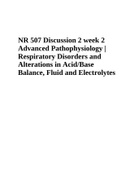
-
NR 507 Discussion 2 week 2 Advanced Pathophysiology | Respiratory Disorders and Alterations in Acid/Base Balance, Fluid and Electrolytes
- Exam (elaborations) • 66 pages • 2023
- Available in package deal
-
- $16.49
- + learn more
NR 507 Discussion 2 week 2 Advanced Pathophysiology | Respiratory Disorders and Alterations in Acid/Base Balance, Fluid and Electrolytes. Discussion Part Two (graded) Tammy is a 33-year-old who presents for evaluation of a cough. She reports that about 3 weeks ago she developed a “really bad cold” with rhinorrhea. The cold seemed to go away but then she developed a profound, deep, mucus-producing cough. Now, there is no rhinorrhea or rhinitis—the primary problem is the cough. She devel...
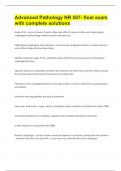
-
Advanced Pathology NR 507- final exam with complete solutions
- Exam (elaborations) • 130 pages • 2023
-
- $14.99
- + learn more
Angle of His Creates a flap valve effect to prevent reflux and makes gastro esophageal junction longer which increases the pressure GERD (gastroesophageal reflux disease) A digestive disease in which stomach acid or bile irritates the food pipe lining. Obesity makes the angle of His a widened angle which decreases the pressure at the gastro esophageal junction big fatty meals and carbonation stretches the stomach out which thins out the muscles around the stomach which decreases t...
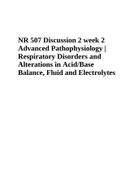
-
NR 507 Discussion 2 week 2 Advanced Pathophysiology | Respiratory Disorders and Alterations in Acid/Base Balance, Fluid and Electrolytes
- Exam (elaborations) • 66 pages • 2023
-
Available in package deal
-
- $16.49
- + learn more
NR 507 Discussion 2 week 2 Advanced Pathophysiology | Respiratory Disorders and Alterations in Acid/Base Balance, Fluid and Electrolytes. Discussion Part Two (graded) Tammy is a 33-year-old who presents for evaluation of a cough. She reports that about 3 weeks ago she developed a “really bad cold” with rhinorrhea. The cold seemed to go away but then she developed a profound, deep, mucus-producing cough. Now, there is no rhinorrhea or rhinitis—the primary problem is the cough. She devel...
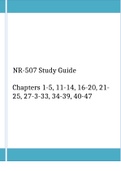
-
NR-507 Final Exam Study Guide Chapters 1-5, 11-14, 16-20, 21-25, 27-3-33, 34-39, 40-47 (Newest Version 2023/2024) Complete Solutions
- Exam (elaborations) • 24 pages • 2023
-
- $16.99
- + learn more
NR-507 Study Guide Chapters 1-5, 11-14, 16-20, 21-25, 27-3-33, 34-39, 40-47 NR-507 Study Guide Chapters 1-5, 11-14, 16-20, 21-25, 27-3-33, 34-39, 40-47 1. Types of immunity-e.g. innate, active, etc (ch 7 ,191) Innate immunity includes two lines of defense: natural barriers and inflammation Natural barriers are physical, mechanical, and biochemical barriers at the body’s surfaces and are in place at birth to prevent damage by substances in the environment and thwart infectio...
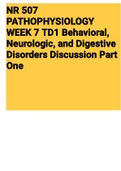
-
Exam (elaborations) NR 507 PATHOPHYSIOLOGY WEEK 7 TD1 Behavioral, Neurologic, And Digestive Disorders Discussion Part One
- Exam (elaborations) • 37 pages • 2022
-
- $8.49
- + learn more
Exam (elaborations) NR 507 PATHOPHYSIOLOGY WEEK 7 TD1 Behavioral, Neurologic, And Digestive Disorders Discussion Part One 1 Analyze pathophysiologic mechanisms associated with selected disease states. (PO 1) 2 Differentiate the epidemiology, etiology, developmental considerations, pathogenesis, and clinical and laboratory manifestations of specific disease processes. (PO 1) 3 Examine the way in which homeostatic, adaptive, and compensatory physiological mechanisms can be supported...
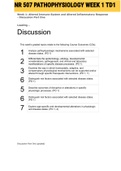
-
Exam (elaborations) NR 507 PATHOPHYSIOLOGY WEEK 1 TD1
- Exam (elaborations) • 50 pages • 2022
-
- $9.49
- + learn more
Exam (elaborations) NR 507 PATHOPHYSIOLOGY WEEK 1 TD1 This week's graded topics relate to the following Course Outcomes (COs). 1 Analyze pathophysiologic mechanisms associated with selected disease states. (PO 1) 2 Differentiate the epidemiology, etiology, developmental considerations, pathogenesis, and clinical and laboratory manifestations of specific disease processes. (PO 1) 3 Examine the way in which homeostatic, adaptive, and compensatory physiological mechanisms can be s...
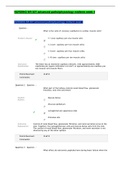
-
Exam (elaborations) nursing pharmacology NURSING NR 507 advanced patholphysiology midterm week 4
- Exam (elaborations) • 24 pages • 2022
-
- $16.49
- + learn more
NURSING NR 507 advanced patholphysiology midterm week 4 NURSING NR 507 advanced patholphysiology midterm week 4 NURSING NR 507 advanced patholphysiology midterm week 4 NURSING NR 507 advanced patholphysiology midterm week 4 NURSING NR 507 advanced patholphysiology midterm week 4 NURSING NR 507 advanced patholphysiology midterm week 4
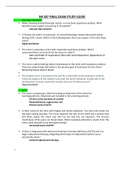
-
NR 507 FINAL EXAM STUDY GUIDE with Q&A
- Other • 54 pages • 2021
- Available in package deal
-
- $13.99
- + learn more
NR 507 FINAL EXAM STUDY GUIDE NR 507 FINAL EXAM STUDY GUIDE 1. Acid base imbalance While checking arterial blood gas results, a nurse finds respiratory acidosis. What does the nurse suspect is occurring in the patient? reduced tidal volumes A 20-year-old male is in acute pain. An arterial blood gas reveals decreased carbon dioxide (CO2 ) levels. Which of the following does the nurse suspect is the most likely cause? Hyperventilation The nurse is assessing a client with suspected re...
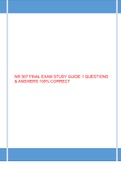
-
NR 507 FINAL EXAM STUDY GUIDE 1 QUESTIONS & ANSWERS 100% CORRECT
- Exam (elaborations) • 56 pages • 2023
-
- $17.99
- + learn more
NR 507 FINAL EXAM STUDY GUIDE 1 QUESTIONS & ANSWERS 100% CORRECT NR 507 FINAL EXAM STUDY GUIDE 1 QUESTIONS & ANSWERS 100% CORRECT Reproductive: The Menstrual (Ovarian) Cycle: Purpose: Pregnancy and menstrual bleeding (the menses). Starts with Menarche (first menstruation) ends with menopause (cessation of menstrual flow for 1 year). Cycles are anovulatory at first and may vary in length from 10 to 60 days then regular patterns of menstruation and ovulation occur lasting...
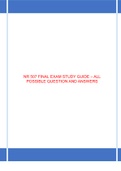
-
NR 507 FINAL EXAM STUDY GUIDE – ALL POSSIBLE QUESTION AND ANSWERS 100% CORRECT
- Exam (elaborations) • 29 pages • 2023
-
- $17.49
- + learn more
NR 507 FINAL EXAM STUDY GUIDE – ALL POSSIBLE QUESTION AND ANSWERS NR 507 FINAL EXAM STUDY GUIDE – ALL POSSIBLE QUESTION AND ANSWERS 1. Acid base imbalance While checking arterial blood gas results, a nurse finds respiratory acidosis. What does the nurse suspect is occurring in the patient? reduced tidal volumes A 20-year-old male is in acute pain. An arterial blood gas reveals decreased carbon dioxide (CO2) levels. Which of the following does the nurse suspect is the most...

How did he do that? By selling his study resources on Stuvia. Try it yourself! Discover all about earning on Stuvia


